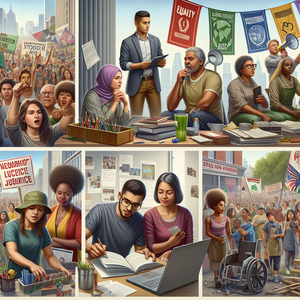
Exploring Careers in Social Justice: Roles, Responsibilities, and Paths to Making a Difference
In today's world, the pursuit of social justice has become increasingly vital. With a growing focus on equity, human rights, and addressing systemic inequalities, a wide array of career opportunities has emerged for those passionate about creating change. This guide delves into various professions within the social justice sector, highlighting their responsibilities, educational prerequisites, and the profound impact they can have on communities and society at large.
Job Summaries:
Social Worker:
- Social workers play a crucial role in enhancing the lives of individuals and families by linking them with necessary services.
- They assess needs, design treatment plans, and advocate for clients' rights.
- A degree in social work is required, along with appropriate licensing.
- This profession is instrumental in addressing systemic barriers faced by vulnerable populations.
Policy Analyst:
- Policy analysts focus on researching and evaluating social justice policies.
- They offer insights that can shape decision-making.
- They utilize data analysis to propose initiatives aimed at advancing equity.
- A background in public policy or political science is essential for this role.
- This role is central to crafting policies that promote social justice.
Victim Advocate:
- Victim advocates support individuals impacted by crime.
- Helping them navigate the legal system and access resources.
- A background in social work or psychology is beneficial.
- Specialized training in advocacy is important.
- This role is vital for empowering victims.
- Ensuring their voices are heard in the justice process.
Grant Writer:
- Grant writers are responsible for identifying funding opportunities.
- Grant writers craft compelling proposals for social justice initiatives.
- Strong writing skills are crucial for grant writers.
- Knowledge of the grant application process is important.
- This role is essential for securing funding.
- Securing funding allows organizations to expand their outreach and impact.
Community Developer:
- Community developers work to improve social, economic, and environmental conditions in underrepresented areas.
- They engage residents to assess needs and implement empowering programs.
- A background in urban planning or social work is advantageous, complemented by strong interpersonal skills.
Social and Community Service Manager:
- These managers oversee social service programs and lead organizations tackling social justice issues.
- They develop policies and coordinate outreach efforts.
- A bachelor’s degree in social work or public administration is typically required, along with managerial experience.
Public Health Educator:
- Public health educators focus on promoting wellness and equitable access to healthcare.
- They create educational content and conduct workshops to raise awareness about health disparities.
- A degree in public health is necessary for this role, which plays a key part in advocating for community health.
Lawyer:
- Lawyers in the social justice sphere address civil rights, discrimination, and public interest cases.
- They provide legal counsel and advocate for policy changes.
- A law degree and passage of the bar exam are essential for this critical role.
Fundraiser:
- Fundraisers strategize ways to secure financial support for social justice organizations.
- They design campaigns and manage events to engage donors.
- Backgrounds in marketing or nonprofit management are beneficial in this role.
Mental Health Counselor:
- Mental health counselors provide therapeutic support to individuals facing emotional challenges.
- They focus especially on underserved communities.
- A master's degree in counseling or psychology is typically required for this impactful profession.
Urban Planner:
- Urban planners create land use plans that improve community infrastructure and ensure equitable resource access.
- A degree in urban planning is necessary for this role, which advocates for inclusive development.
Education Coordinator:
- Education coordinators design programs that raise awareness of social justice issues in educational settings.
- A degree in education or social work is often required.
- This role fosters understanding and advocacy among students.
Correctional Officer:
- Correctional officers oversee individuals in jails and prisons.
- They focus on rehabilitation and humane treatment.
- A high school diploma is typically required for this role.
- This role is crucial for promoting fairness in the criminal justice system.
Social Justice Consultant:
- Consultants help organizations assess and improve their practices related to equity and inclusion.
- They conduct workshops and provide training to align organizational policies with social justice principles.
Nonprofit Manager:
- Nonprofit managers lead organizations dedicated to social justice.
- They oversee staff and program development.
- A degree in nonprofit management is essential for effective implementation of initiatives.
Community Organizer:
- Community organizers mobilize individuals to advocate for social change.
- They develop campaigns and facilitate meetings to empower communities to voice their concerns.
Medical Interpreter:
- Medical interpreters bridge communication gaps between healthcare providers and patients who speak different languages.
- Certification and fluency in multiple languages are necessary to ensure equitable access to healthcare.
Disability Rights Advocate:
- Disability rights advocates promote policies that ensure rights and inclusion for individuals with disabilities.
- A background in social work or advocacy is typically required to support this vital cause.
Environmental Justice Specialist:
- Environmental justice specialists address the impact of environmental hazards on marginalized communities.
- A degree in environmental science or public policy is often required for this important role.
Human Rights Officer:
- Human rights officers monitor violations and advocate for affected individuals on a global scale.
- A degree in international relations or law is typically required for this crucial position.
This guide offers a glimpse into the diverse careers available in the social justice sector, each presenting unique opportunities to create meaningful change. As you consider these paths, reflect on how your skills and passions align with the responsibilities of each role. Pursuing a career in social justice not only enriches your own life but also contributes significantly to the quest for equity and justice in society. Explore current job openings today and take the first step toward a fulfilling career that makes a difference in the world.
Explore More Jobs
